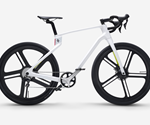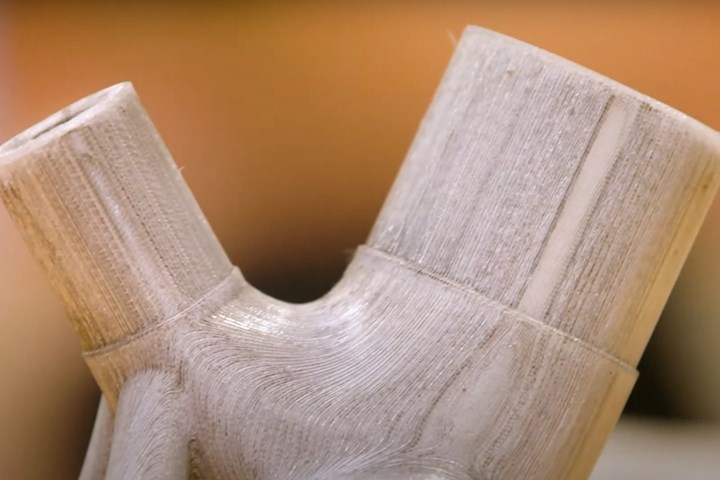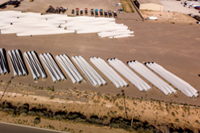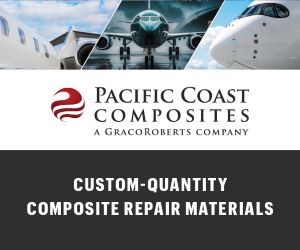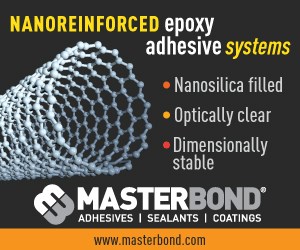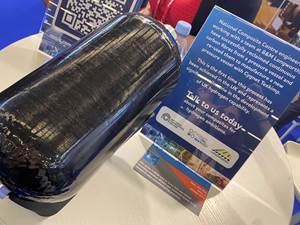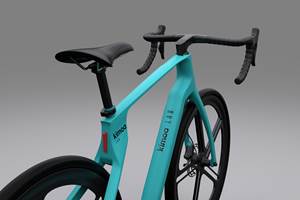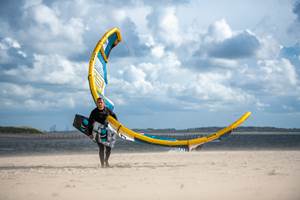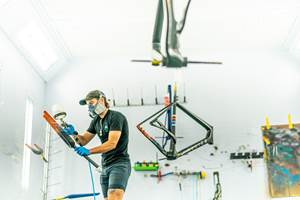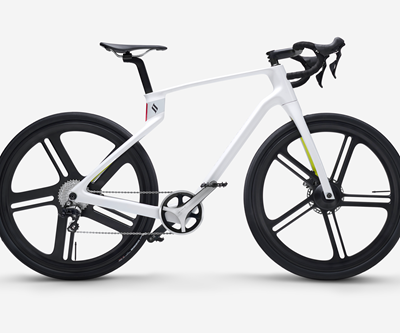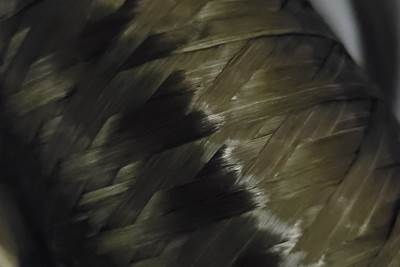Brightlands Materials Center advances continuous fiber 3D printing in Limberg Bike
Other composites innovations include recyclable CFRP connectors, interwoven Dynema/carbon fiber reinforcements and integrating damage sensors into the frame.
Brightlands Materials Center (Gleen, Netherlands) is a research organization that develops innovative materials solutions for a sustainable future, with inspired talents and in collaborations with industry, academia and entrepreneurs. Ongoing programs investigate polymer materials and composites in additive manufacturing, lightweight automotive, sustainable buildings and more at the Brightlands Chemelot Campus in Sittard-Geleen, Netherlands.
Here, the company has completed the first prototype of the 100% Limburg Bike, an innovative racing bike for experienced amateur cyclists which demonstrates an array of innovations in composite materials, additive manufacturing and sustainability.
“This Limburg Bike features so many innovations,” says Menno Smeelen, project leader for the 100% Limburg Bike project. “The tubes and front fork are made of interwoven carbon and super-strong Dyneema fiber from DSM. The connecting pieces used in the prototype are now made of titanium, printed with the purpose-built 3D printer here at the campus. One of the things that make it so unique is the knowledge and skills of Chemelot Innovation and Learning Labs (CHILL) and Brightlands Materials Center. Other innovations include connectors made of recyclable plastic reinforced with carbon fibers, and the development of a new bio-based
adhesive joint to attach the connecting pieces to the frame. The
combination results in a super-strong yet ultralight frame that is virtually
unbreakable,” notes Smeelen.
Consortium for sustainable customization
A consortium of several regional companies has been involved in the
development of the first prototype, including carbon specialists Eurocarbon (Sittard, Netherlands) and CeraCarbon (Stein, Netherlands). They have succeeded in interweaving the DSM fiber Dyneema with carbon using a new method. Belgian Cycling Factory, owner of the Ridley brand, played a decisive role in the design.
“This is a unique bike,” says former professional cyclist Bram Tankink, closely
involved with the Limburg Bike project and sustainability ambassador at
Brightlands Chemelot Campus. “What has made it so unique are the materials
used, the cooperation between SMEs (small and medium enterprises) and knowledge institutes, and the focus on sustainability and use of circular materials. Circularity is the center of attention and an important pillar of the campus. Another unique aspect is that the frame is tailor-made to the user. The variable angles and lengths of the tubes mean that they can be adjusted so you get a perfect fit with your bike.”
Testing and production
The Limburg Bike project involves an investment of more than €1.8 million.
Brightlands Chemelot Campus, the Province of Limburg and the participating
companies are investing €1.2 million, and the European ERDF OPZuid
subsidy program will be contributing the remaining €600,000. The prototype
of the 100% Limburg Bike will be in the testing phase for some months to optimize the design in terms of weight and stiffness and then to test it
among experienced amateur cyclists under the supervision of Mullens Sports & Health Innovations. Additionally, KEMBIT and Brightlands Materials Center will be working to incorporate sensors in the frame to measure any damage occurring after a fall, for example.
Smeelen expects the 100% Limburg Bike is expected to go into production next summer. Though pricing has not yet been finalized, he asserts, “It will be a bike for real enthusiasts who want something unique. A light and strong customized bike with all sorts of technical tours de force. It has already been established that the bicycle will be produced in the region by the consortium. A lot of interest has already been shown in the bicycle, and after the initial announcement in 2019 we received a lot of responses, even from as far away as America and Asia. There’s absolutely a market for a personalized bike.”
Teamwork
Bert Kip, CEO of Brightlands Chemelot Campus, is proud of The 100% Limburg Bike. “It’s the result of a great example of teamwork. Entrepreneurs based both on and off the campus have made optimal use of the facilities, knowledge and skills here. The bicycle involves various material innovations that will make their way into other sectors such as aviation and automotive. This is exactly what we want to achieve here at Brightlands Chemelot Campus: inventing and valorizing innovations, together with the business community.”
Related Content
JEC World 2022, Part 2: Recycling, natural fibers and additive manufacturing
CW associate editor Hannah Mason recaps several technologies seen on display at JEC World 2022, including new developments from Bcomp, Massivit 3D, Gen 2 Carbon and more.
Read MoreTwo-time F1 champion Fernando Alonso, SimplyEV debut Kimoa e-bike at Miami Grand Prix
The Formula One driver’s sustainable mobility Kimoa brand is debuting its fully customizable carbon fiber e-bike powered by 3D printing firm Arevo.
Read MoreAluula introduces lightweight composite materials for wind sports and beyond
The company’s proprietary UHMWPE fabrics combined with technical films in a patented fusion process are said to increase performance and recyclability.
Read MoreCycling forward with bike frame materials and processes
Fine-tuning of conventional materials and processes characterizes today’s CFRP bicycle frame manufacturing, whether in the large factories of Asia or at reshored facilities in North America and Europe. Thermoplastic resins and automated processes are on the horizon, though likely years away from high-volume production levels.
Read MoreRead Next
Arevo launches direct-to-customer 3D-printed bicycle
The Superstrata brand features a fully unibody carbon fiber/polyamide frame manufactured using Arevo’s direct deposition additive manufacturing process.
Read MoreCW’s 2024 Top Shops survey offers new approach to benchmarking
Respondents that complete the survey by April 30, 2024, have the chance to be recognized as an honoree.
Read MoreFrom the CW Archives: The tale of the thermoplastic cryotank
In 2006, guest columnist Bob Hartunian related the story of his efforts two decades prior, while at McDonnell Douglas, to develop a thermoplastic composite crytank for hydrogen storage. He learned a lot of lessons.
Read More

